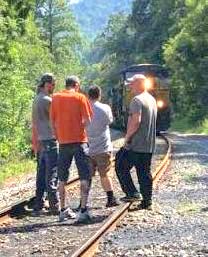
HARLAN COUNTY, USA, August 5—“No Pay! We Stay!” reads the sign by the railroad tracks in Harlan County, Kentucky. Laid-off coal miners have been blocking nearly a hundred coal cars loaded with $1 million of coal since July 29.
The action of workers blocking coal at the point of production, taking possession of the wealth they produced as a means to pressure the company, demonstrates the potential of workers fighting for their class interests as a revolutionary force.
When these miners join with other workers, students and soldiers in a communist revolution, we can build a world where we produce what workers need and share the fruits of our labor. That’s unlikely to be coal—a major source of global warming.
In the meantime, coal miners are bearing the brunt of the decline of the industry that they have spent their whole working lives in. The company has filed for bankruptcy. Workers’ paychecks have bounced. They can’t access the money put aside in their 401(k) accounts.
“The deck is stacked,” said a Red Flag reader who grew up in the region. “Bankruptcy has always served the corporation.” And even when the law requires companies to post a bond to require reserves to pay workers, that law is not enforced.
The community has shown up for these miners, bringing food, water, and tents, and taking turns blocking the tracks. Coal miners in Harlan County, and in the region in general, have a militant history of class struggle. They defied the bosses’ law and took on the bosses’ gun thugs in strikes in the 1930s and the 1970s.
“Nothing has really changed. Profits over people is still the game. We need to support even a spark of rebellion in these workers,” said our friend. “Break the law…weld the train wheels to the tracks…Go for the throat of this blood-sucking bunch.”
As our friend agreed, reform struggles are always defensive. You fight like hell, win a little, but the capitalists take it back and more in the end. Only communist revolution will allow us to build a world without these capitalists and their system.


